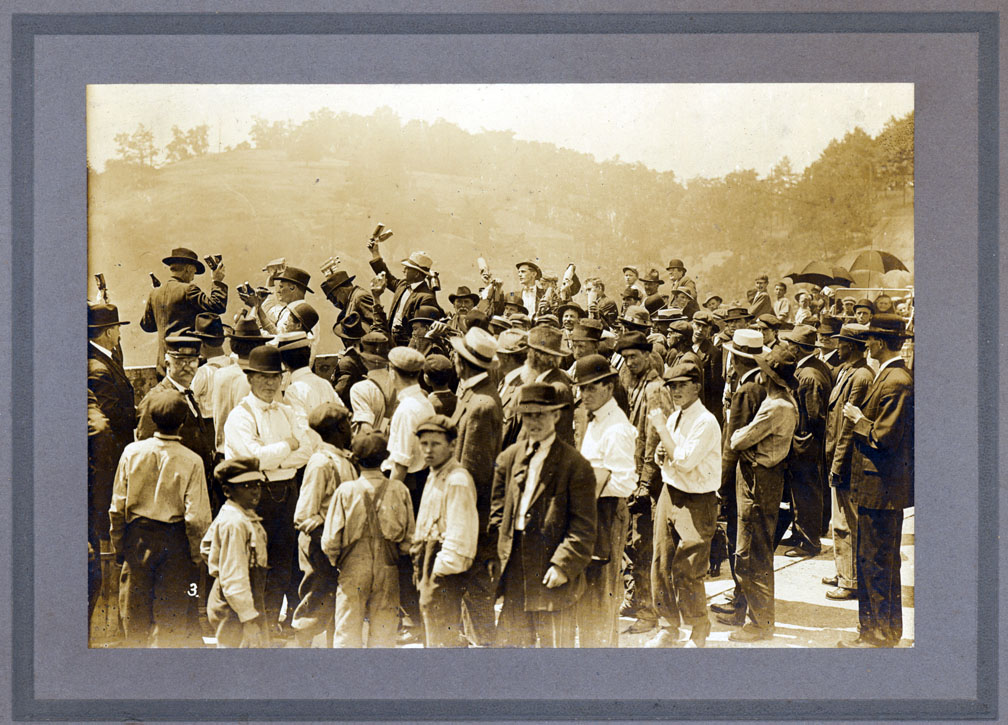An advertisement in the Sept. 28, 1907, edition of The Asheville Citizen promised a great Prohibition rally and parade that day. The event was set to begin at 11 a.m. at the auditorium and would feature the First Regiment Band. Following the march, speeches would be delivered by Judge J.C. Pritchard and former Sen. (and future Gov.) Craig Locke. The advertisement declared: “All men, women and children in the county who oppose the manufacture and sale of liquor in Asheville are invited and urged to come prepared to join the parade and help us drive liquor from our city.”
The following day’s paper featured the entire transcript of Pritchard’s speech. In it, the judge proclaimed: “The good people of the city of Asheville are engaged in a determined effort to drive bar rooms from the midst.”
Tourism was one of the leading arguments against Prohibition. Businessmen asserted travelers would not venture into dry areas. But Pritchard disagreed. “How many men and women are attracted to Asheville by whiskey?” he asked. “Is it our whiskey, or is it our beautiful scenery and excellent climate which attract annually thousands of the best people of other sections to the ‘Land of the Sky?’”
Pritchard went on to characterize drinkers as a “bloated lot of sots.” And despite its appeal to visitors, he described Asheville as being “as wicked as any city” he had seen. Such a reputation, the judge argued, damaged the area’s appeal to manufacturers. And with a growing population of 22,000, Pritchard insisted residents could not risk turning away such opportunities.
Near the end of his talk, Pritchard alluded to his former days spent in Madison County, an area once nearly ruined by alcohol. Pritchard asserted:
“For years that county was cursed by the sale of whiskey. Affairs became so intolerable in that county on account of the many crimes that were committed that some of the newspapers spoke of that section as ‘bloody Madison’ but now that prohibition prevails, the tables are turned and this community might be properly termed ‘bloody Asheville.’”
Much debate ensued, both in print and on the streets. In that same day’s paper, an unnamed resident wrote in opposition to Prohibition. The writer insisted the law had less to do about alcohol and more to do about class. The article read: “The prohibitionist does not pretend that the success of their movement will prevent the rich and well-to-do man from getting and drinking all the wine, whiskey, brandy, beer and absinthe he wants.” But for the working man, the writer contested, such thirst would go unsatisfied.
Another article in that day’s paper claimed Prohibition would “hurt the cause of Christianity.” The correspondent, known only by the initials A.S.M., asked proponents of the law:
“Why did God give us the ten commandments, my esteemed prohibition advocate, and why would He give us these ten commandments unless it was to resist evil by observing them? You, gospel minister, tell me if Christianity would have dared to say, ‘We will not need them, O God, for we will destroy the evil that would tempt us to break them.’ That is exactly the import of your prohibition laws, and that is why you do not succeed and will never succeed with prohibition.”
On Oct. 5, 1907, opponents of Prohibition filled the county courthouse. The following day’s paper included excerpts from speeches offered that evening. Among the speakers was resident Alfred S. Barnard. He called Prohibition “the ultimate destruction of human liberty. You hear the same old slogan, ‘Save the people from themselves.’ Prohibition is a species of tyranny to which the people of Asheville will not submit.”
Despite Barnard’s assertion, the city did submit. On Oct. 8, votes were cast. The following day’s headline in The Asheville Citizen read, “Avalanche of ballots rides prohibition on crest of victory’s wave.” While women did not yet have the right to vote for the measure, they, along with their children, played a crucial role in discouraging (and in some instances blocking) anti-prohibitionists from the ballot box. The paper read:
“Seizing the polls at daylight, active, alert, well organized, the women and children absolutely captured the city and there never was a moment from daylight to dark when they did not dominate the situation. As a demonstration of their resistless power yesterday’s election will be a monument. Singing, praying, cheering, hundreds of them at the polling places blocked the streets and swept in a stream of votes as resistless as the Atlantic tides.”
On May 26, 1908, North Carolina followed in Asheville’s footsteps, becoming the first state in the South to pass a referendum on Prohibition. Eleven years later, with the ratification of the 18th Amendment, Prohibition went into effect across the nation and would remain so until Dec. 5, 1933.



Always go fishing with two Baptists.
That way one will snitch on the other for secretly drinking all your beer.
‘Judge Pritchard described AVL to be as wicked a city as he had seen’ … roflmao! Foreshadowing of ‘Cesspool of Sin’ … demon alchehall has ruirnt us.